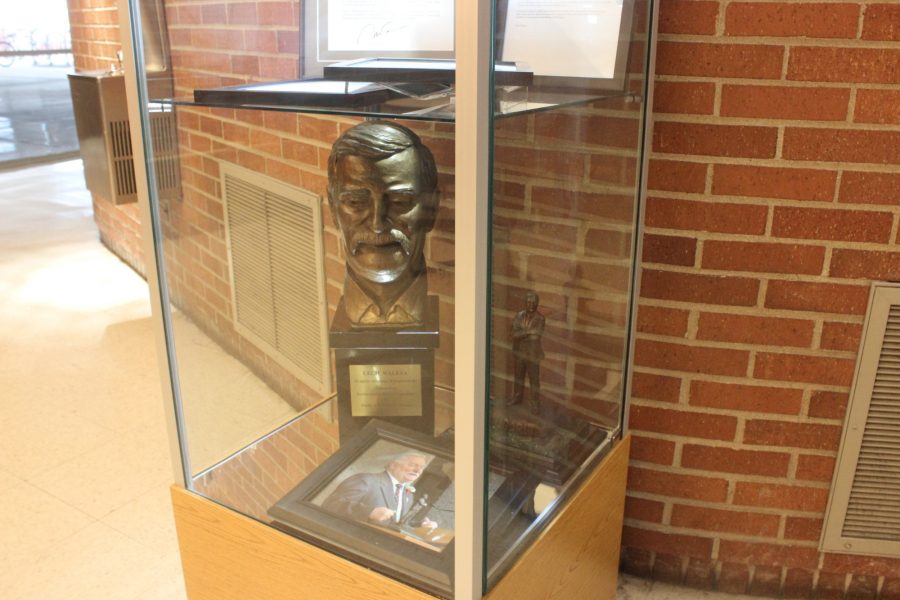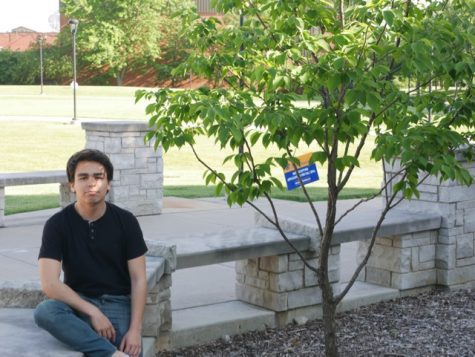Lech Walesa Hall: His name, here to stay
A display shows a bronze bust and Walesa’s written letters to NEIU.
February 8, 2017
Lech Walesa, workers’ rights activist, leader of the Solidarity Party in Poland and former president of the Republic of Poland is the very name engraved on one of our most well known buildings here at NEIU. He changed the lives for workers throughout Poland and established democracy; winning the Nobel Peace Prize illustrated his remarkable dedication to liberating those who were voiceless during an unbearable period under a communist regime However, faculty, students and human rights activists have been upset with the building being named after him. .
In 2013, Walesa made controversial comments about the LGBTQ community. On TVN, a popular Polish news network, the democratic icon said, “They have to know that they are a minority and adjust to smaller things, and not rise to the greatest heights…a minority should not impose itself on the majority.” His words sparked an outrage in Poland and abroad. The news traveled all the way to Chicago, where his name is plastered on one of our university’s buildings.
His words caught many people off guard. He was isolating a group of people who were, and still are, fighting for their right to be treated as equal citizens across the globe.
In 2014, an NEIU student by the name of Mike Lackovich launched a protest against the name of the building, “Lech Walesa Hall.” CNN covered the story, running the headline, “NEIU Board of Trustees Embrace Homophobic Leader Over Student Safety.” Students collected 400 signatures petitioning the removal of Lech Walesa’s name from the building. The University Advisory Council unanimously voted to have the name replaced with a better suited candidate, but the decision was overturned by NEIU’s president at the time, Sharon Hahs.
Inside Lech Walesa Hall there’s a digital display of his words along with the community’s response. The slideshow begins with a timeline of his anti-gay rhetoric and the action, or rather lack of action, that was taken on the part of the university administration. NEIU’s equality statement is then shown along with hoards of articles and pictures depicting those not in favor of his homophobic comments.
Though many students are unfamiliar with him, Walesa is best known for his bravery in revolutionizing the rights of workers in Poland during the 1970’s and 80’s. He organized a monumental strike in 1980 that forced communist authorities to negotiate with him, giving workers the right to strike and organize their own independent union.
In 1981, Walesa was the chairman of the Solidarity Congress, the first independent labor union. The union gave rise to a non-violent anti-communist social movement in response to Poland’s government control over economics, elections and disregard for the human rights of workers. Workers had no way to address grievances or form basic rights because they were disallowed from forming unions. Instead of the government controlling the economy, hardworking citizens were finally given the freedom to build their own wealth.
In 1983, he was awarded the Nobel Peace Prize for his activism under the Jaruzelski regime. The regime censored and jailed those who spoke out against their conditions. Citizens were monitored, food, and even gasoline was rationed. The average household income fell by 40% and more than 700,000 people fled Poland. Despite winning the Nobel Prize, Walesa was under surveillance by the communist government for his democratic activism. He was arrested and jailed several times throughout his lifetime. Fortunately, Walesa was so influential that the Polish government negotiated with him and his Solidarity colleagues, which led to a non-communist government.
In 1990, Walesa became Poland’s president until 1995. He was the candidate that free-thinkers, idealists, activists and democrats wanted. In 1996, he founded the Lech Walesa Institute, whose mission is to support democracy across the globe.
Former NEIU president Sharon Hahs noted that Lech Walesa’s name was synonymous with freedom. His comments in 2013 contradict his core beliefs of fighting for the fair treatment of citizens in repressed countries. It almost seemed as if he had forgotten the isolation, despair and imprisonment caused by his own government. Walesa’s anti-gay comments, whether intentionally disparaging or not, were destructive to members of the gay community by insulting them and reinforcing an anti-gay rhetoric.
Walesa was born in 1943, and from a generational perspective, he certainly was not raised in a time where homosexuality was discussed, let alone tolerated. Same-sex marriage is still illegal in Poland. According to LGBTQ Nation, an equal rights organization, only 23 out of 196 countries have legalized gay marriage.
Still, one would think that a freedom fighter like Walesa would have more liberal views on gay rights. As someone who was persecuted for representing an outspoken minority in the conservative political realm of Poland, Walesa was rejected by mainstream society and cast as an outsider under a government hungry for power and control. Walesa is defined in history as being a progressive workers’ rights leader. Despite his background in grassroots activism, his views persecute a group of vulnerable people who have been antagonized, alienated, assaulted and even beheaded in several countries.
Three years after the ordeal, people are still expressing their concern over the name of the building hundreds of students enter and exit every day. In a time where mentions of LGBTQ rights have been removed from the White House website, the largely socially liberal community at NEIU is in a place of emotional uncertainty. There is no saying what the future will hold in terms of the name that holds much meaning for many aware of both Walesa’s legendary history and anti-LGBTQ sentiments.
If you view Walesa in his entirety, he is a truly brilliant man. He changed politics in Poland for the better. He led an entire nation under the premise that the people are the ones who hold the power, and that individualism is a personal right, not a privilege. He fought against a powerful government so that workers would receive fair treatment and wages based on performance and dedication. He advocated for free speech and personal liberty in Poland, and he won. Based on his tremendous success in revolutionizing politics and becoming a world leader, his name still stands for democracy and liberation.
As a largely liberal student body, we are challenged on an everyday basis to be understanding of those who are different in unfavorable contexts.
In a time where politics are polarized and people are pitted against each other, changing the name of Lech Walesa hall would only emphasize the liberal stereotype that they are hypocritical, self-entitled whiners who can’t accept views different from their own. It’s essential to realize that people are allowed to have their own opinions, and that influential leaders are flawed. With our new president in office, the best attitude to have is that of optimism. We should apply a positive attitude to Walesa. Does the name on a building really have to influence emotional stability?
Lech Walesa Hall is here to stay, and so is his awe-inspiring legacy.










Jesus Alfaro • Dec 4, 2020 at 4:00 pm
Just stumbled upon this as I wanted to learn more about my transfer school. Needless to say, this is not something I wish I saw. I am a queer latinx student and am deeply disappointed with the schools decision to not change the name. There are definitely more awe inspiring individuals who are not anti queer/ homophobic/ transphobic .
Justin Boltz • Jan 9, 2018 at 3:18 pm
I just stumbled upon this in the lobby and I have to say I am extremely disappointed in the universities decision not to change the name of the building. I bet there are some awe inspiring women or people of color that don’t have anti-LGBT to spout out we could replace him with.